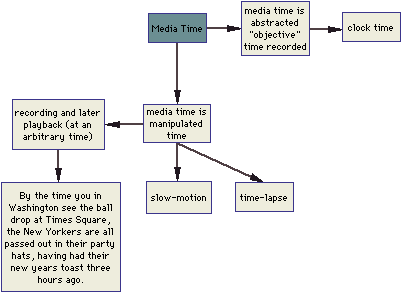

What happens when we can use a linear recording format to capture events
in time as they are happening, allowing us to view or listen to the recording
at any arbitrary time later? We are also able to edit the original recordings,
splicing together things that happened at different times, thus making them
appear to have been consecutive.

You live in a basement apartment, with a huge videoscreen on the wall. The videoscreen is normally fed from a camera on the rooftop of your building, giving you the equivalent of a fourth story view. One day at six A.M. the building manager connects a video deck in place of the rooftop camera, and plays a tape of sunset.Media allows us to displace ourselves in time and space. Your basement apartment becomes a fourth floor apartment, your morning becomes evening.
Your building manager loves to travel all over the world, and loves to record sunsets on her video camera wherever she goes. One day she decides to make a video of all her favorite sunsets. She superimposes a title on each image which tells where the image was taken, and includes a small clock which shows the time the original recording was made. Some of the images were recorded in time-lapse. Some are slow-motion. Others play backwards. They are arbitrarily edited together. When you watch this video on your wallscreen, it is as if your apartment "window" faces each scene as it plays back. You are in Caracas in 1987, at 8PM, in realtime. You are in Tibet in 1993 at 7:37PM in time lapse - you can watch the minutes tick by as if they were seconds. You are in New York City last June, watching the sunset backwards - the sun seems to rise over the Hudson as ships retrace their wakes and the sky grows lighter.Media allows us to manipulate time: cutting and pasting, stretching, compressing, and reversing. In your apartment, you are travelling all over the world, and all over time, sometimes moving faster than time, sometimes moving slower, sometimes moving backwards.
People using modern media technology are experiencing an artificial construction of time. Media time is time interruptus. Media consists of recordings and live events - segments of absolute length, with absolute starts and ends. Because of this, ideas like eternity, perpetuality, or even the 'flow' of time bear no relevance here except as abstract concepts.
TimeWorks was created by Jeremiah Lyman Moore